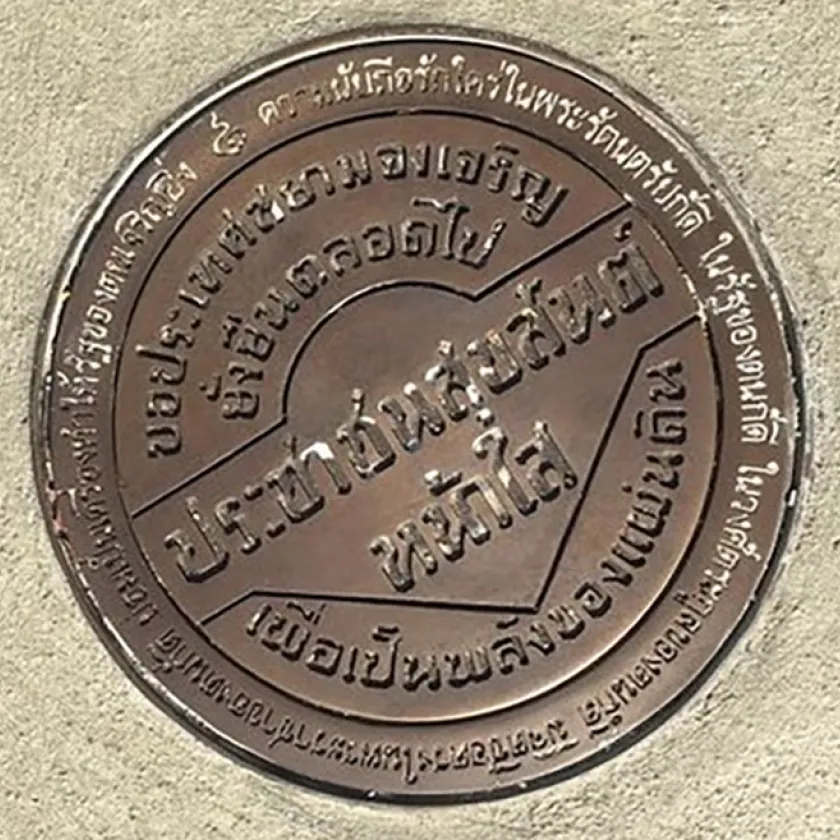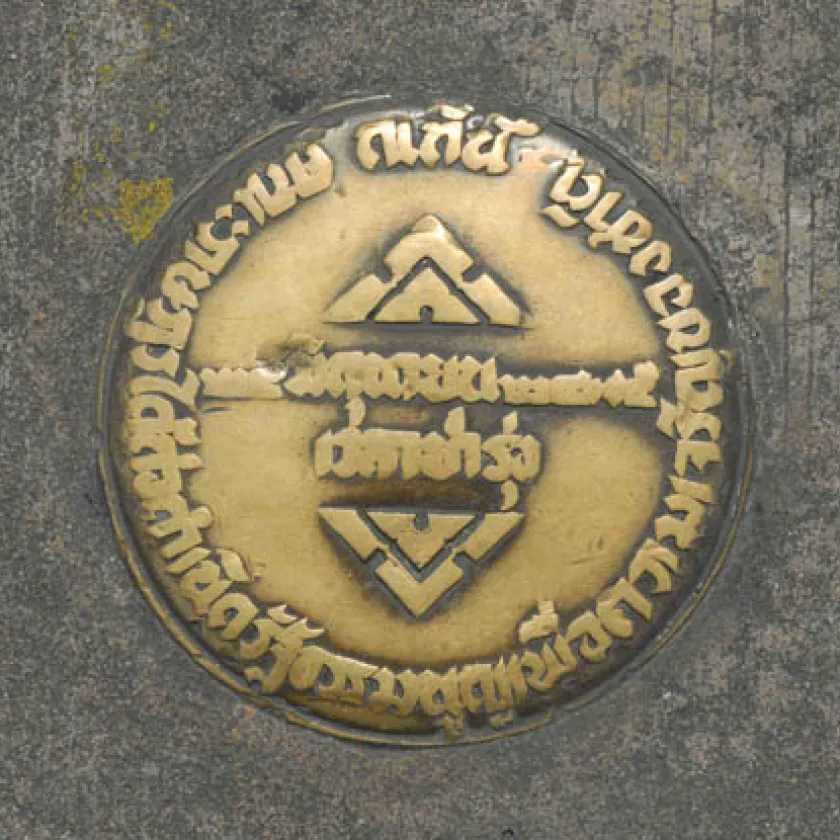Whereas the People's Party Plaque is one of the significant symbols of the transition to democracy in Thailand, the "Fresh-Faced Plaque," which was discovered to have been secretly embedded by unidentified individuals to replace the original People's Party Plaque, reflects the efforts of the conservatives to obstruct democratic processes by erasing the history of the People's Party. However, in another sense, this new plaque has become a symbol that has inspired the new generation, especially after the 2014 coup, to rise up and oppose the dictatorial government, while also reviving the history and significance of the People's Party.
The Fresh-Faced Plaque is a round brass plaque of the same size as the People's Party Plaque, but with a completely different inscription, which reads: "Respect and affection for the Triple Buddhist Gem, for one's state, for one's lineage, and loyalty to one's king are means to bring prosperity to one's state. May the Siamese nation prosper forever, with happy, fresh-faced citizens as the country's force." This plaque was first discovered on the morning of April 14, 2017. It is believed that it was replaced between April 3-7 during the restoration of the nearby Equestrian Statue of King Chulalongkorn. However, no party has come forward to claim responsibility for the replacement, including General Prayut Chan-o-cha, who confirmed that the government had no knowledge of the matter. Thamrongsak Petchlertanan, a political science professor at Rangsit University and the author of the book "2475[1932] and 1 Year After the Revolution," analyzed that the inscription on the new plaque (which later came to be called the Fresh-Faced Plaque) matches the aphorism in the royal seal of the Most Illustrious Order of Chula Chom Klao (M.C.K.). It uses several archaic terms such as "Siamese nation," "happy," and "fresh-faced," which are found in the stone inscription of King Ramkhamhaeng the Great. These could be interpreted as indicating the happiness and cheerfulness of the people, but they contradict the term "citizens" (prachachon), which is a post-1932 revolution term (previously, the word to use was "ratsadon"). Overall, the new plaque attempts to convey the country's collective well-being but omits the democratic ideals of the original plaque.
The mysterious replacement of the plaque has sparked significant public interest, with many parties questioning the reasons for the change and calling for the return of the original People's Party Plaque. For instance, on April 17, 2017, students from the PPDD Thammasat group and the Seri Kaset group jointly organized an event called "Can't the People Be Not Fresh-Faced??" at Pridi Banomyong Memorial, Thammasat University, Tha Prachan Campus. They demanded that those responsible for stealing the People's Party Plaque return it. They also launched a petition on Change.org to call for the return of the original plaque. Meanwhile, several individuals faced legal action due to their activism. For example, Srisuwan Janya, who submitted a letter to the Prime Minister to track down the plaque, was detained by police and military and taken to the 1st Division, King's Guard Command Headquarters. Wattana Muangsook faced charges for posting that the People's Party Plaque was a historical artifact, with police claiming he had disseminated false information under the Computer Crimes Act of 2007. Boonsin Yokthip and his colleagues from the National Dhammathipatai Club, who reported the missing plaque, were invited by the military for attitude adjustment at the 11th Military Circle. Similarly, activist and former political prisoner Ekkachai Hongkangwan, who filed a police report and attempted to install a replica of the People's Party Plaque at the original site on June 24, 2017, was arrested by police and sent home that evening. Additionally, various public activities emerged in response to the plaque's replacement, leading to several protests. It can be said that the Fresh-Faced Plaque was not only a symbol installed in place of the People's Party Plaque but also a catalyst that ignited broader movements among the new generation. These movements not only sought the return of the original plaque but also called for reform and respect for the history of the regime change. These protests reflect the public's dissatisfaction with the erasure of history and their desire for freedom in Thai society.


